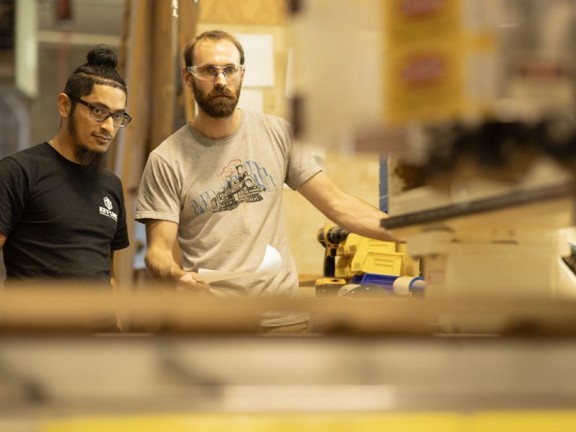The Business Case for Housing Affordability

In a recent interview with Paul Downs, a longstanding business owner in Montgomery County, we delved into the symbiotic relationship between housing affordability and business success. The conversation shed light on the pivotal role that accessible housing options play in attracting and retaining skilled employees, ultimately contributing to the stability and prosperity of both individuals and the County as a whole.
Paul Downs, the owner of Paul Downs Custom Tables and Furniture, established in 1986, emphasized the significance of understanding the commuting challenges faced by their workforce. With a dedicated team of twenty-six employees, the business has witnessed the impact of housing affordability on hiring and retention, especially in a niche manufacturing sector.
Downs acknowledged that commuting time is a crucial factor in hiring and retaining employees. As a solution, they have implemented flexible working hours, a rarity in manufacturing, to accommodate the diverse needs of their workforce. This approach not only fosters a healthy work-life balance but also contributes to the company's impressive retention rates, with some employees having dedicated more than two decades to the business.
When asked about the relationship between the importance of access to affordable housing options and business success, Downs succinctly stated, "Affordable housing is a critical piece of business success in Montgomery County." He emphasized that having a range of affordable and convenient housing options within striking distance of the workplace benefits both employers and employees. This not only maximizes work value but also minimizes the time wasted in commuting, enhancing the overall efficiency and satisfaction of the workforce.
Downs further highlighted the challenge of hiring for positions with lower market wages, emphasizing the broader range of skill sets and work habits at the lower end. He expressed the difficulty of hiring individuals for whom a long commute is a deal-breaker, underscoring the importance of diverse housing options to cater to the varying needs of the workforce.
Reflecting on his own experiences, Downs shared instances where employees, despite their loyalty and skill, chose to leave due to lengthy commutes resulting from lack of reasonable housing options. This resonates with the larger issue of the need for housing options that cater to a wide range of income levels.
In considering the County's role in promoting affordable housing, Downs called for streamlined permitting processes and reduced regulatory obstacles for developers. He stressed the need for initiatives that increase housing supply, making it easier for individuals to build affordable homes in areas with access to public transportation.
In conclusion, the dialogue with Paul Downs illuminated a promising avenue for collaboration between businesses and local authorities in tackling the crucial challenge of housing affordability. This partnership can enhance the workforce's well-being and positively shape the economic landscape of Montgomery County. By fostering an environment where businesses and authorities work hand in hand, a more sustainable and inclusive approach to housing solutions can be realized, contributing to the overall prosperity and vibrancy of the community.